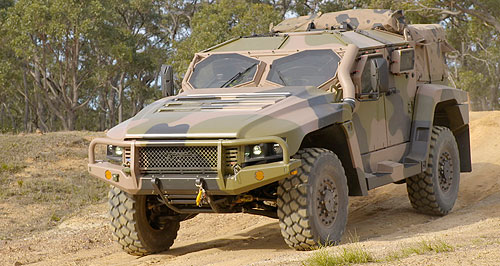Make / Model Search
News - General News - PartsQuickstep wins first automotive contractQuick sticks: Australian company Quickstep will supply the bonnet, side skirts and mudguards for the Thales Hawkei. Local company to be the preferred supplier of parts for the Thales Hawkei29 Oct 2014 By IAN PORTER QUICKSTEP Holdings, the Australian company with world-leading carbon-fibre technology, has been named as the preferred supplier of a number of external panels for the Hawkei army vehicle being developed by Thales. Thales has signed a letter of intent naming Quickstep as the sole supplier of the bonnet, side skirts and mudguards for the Hawkei. Quickstep estimates that it can reduce the weight of the Hawkei bonnet from 50kg for a steel unit to around 20kg for a carbon-fibre unit, with similar savings made on the other parts. While a saving of 100 or even 150kg might not sound much for a seven-tonne machine, weight is critical for the Hawkei because one of the contract criteria is that it must weigh less than the maximum payload of seven tonnes for the Chinook helicopters used by the Australian Defence Forces. Thales vice-president Kevin Wall said the selection of Quickstep as a panel supplier was a result of the pioneering approach Thales is taking to its supply chain. “Quickstep’s record on projects such as the Joint Strike Fighter and Lamborghini performance cars is testament to their unique skills,” he said. Thales is a French defence equipment supplier with a global turnover of €14.2 billion ($A20.4 billion). The Bendigo factory where the 10-seat Bushmaster is currently made and the Hawkei is being developed is its only vehicle plant around the world. The Australian Defence Force (ADF) has named the Hawkei as the preferred vehicle for its LAND 121 Phase 4 project, which calls for the supply of 1300 vehicles to replace the ageing fleet of Land Rovers. However, the ADF is still monitoring development of the Joint Light Tactical Vehicle in the United States, which has been designed to replace the Humvee. A decision is expected in 2015. If Thales is ultimately awarded the contract, it will be the first time Quickstep has applied its patented resin spray technology to an automotive contract. “For us, this contract is very important,” said Quickstep executive director Phillippe Odouard. “It is using the full Quickstep technology for a part that is similar to what we would use for any bonnet on any car.” Apart from Resin Spray Technology, which speeds the layup process, Quickstep has also invented a curing process that does not require expensive autoclave ovens to cure the carbon-fibre parts. The Quickstep process involves immersing the parts, enclosed in a flexible bag, in a mould filled with heated fluid. This gives much more accurate temperature control and flexibility as the process can be interrupted to allow the joining of extra parts before the process is completed. The Quickstep process is best suited for flat parts like door panels and bonnets. Mr Odouard said the Hawkei bonnet was an ideal part for the Quickstep processes because the metal bonnet that would otherwise be used would need two parts. “Normally, in metal, you have a skin and then a reinforcing structure behind. Then you weld the reinforcing structure to the skin. That is two parts and three operations. “Here, we do the whole thing in one shot and the weight compared to a steel bonnet is less than half. This bonnet would normally weigh 50kg. In carbon-fibre it actually weighs about 20kg. That’s an enormous saving.” The cycle time for making the part will be under two hours, less than a quarter of the time needed to make carbon-fibre parts for the Joint Strike Fighter. Even so, Mr Odouard said two hours was “very slow” compared to what Quickstep is aiming for. “The reality is we are looking at a tack time of 10 minutes, from start to finish.” As reported by GoAuto, Quickstep will refine its production processes at its new automotive division to be built on the campus of Deakin University outside Geelong, Victoria. The $5.6 million division will be built adjacent to Deakin’s own fibre development company called Carbon Nexus, which has already attracted wheel-maker Carbon Revolution to the Deakin campus. The Hawkei will be available in several configurations, usually with four to six seats, although the utility version will have two or three seats. It uses a 3.2 litre Steyr six-cylinder turbo-diesel with 200kW and 610Nm and a ZF six-speed automatic transmission.  Read more |
Click to shareGeneral News articlesResearch General News Motor industry news |











Facebook Twitter Instagram